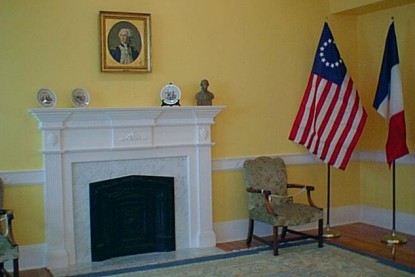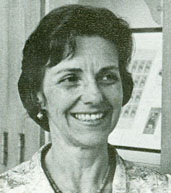LAFAYETTE COLLECTION
 Gilbert du Motier, the Marquis de Lafayette, was a young French soldier who volunteered his services and family fortune in support of the American colonies during the Revolutionary War. After the war the towns of Campbellton and Cross Creek merged, and chose the patriotic name "Fayetteville" in a bid to become the state capital. Lafayette remained a popular figure in both Europe and the United States, and on March 4-5, 1825, he visited Fayetteville as part of a grand tour of all the states.
Gilbert du Motier, the Marquis de Lafayette, was a young French soldier who volunteered his services and family fortune in support of the American colonies during the Revolutionary War. After the war the towns of Campbellton and Cross Creek merged, and chose the patriotic name "Fayetteville" in a bid to become the state capital. Lafayette remained a popular figure in both Europe and the United States, and on March 4-5, 1825, he visited Fayetteville as part of a grand tour of all the states.
Davis Memorial Library's original Lafayette room was dedicated on September 6, 1973, the 216th birthday of the Marquis. A new room opened in the South Wing of the library in 2000. This room is built and furnished in a style popular in southern American homes during the 1820's, the time of the visit of the Marquis de Lafayette to Fayetteville.
The University's collection of Lafayette material dates from 1967, when the school was persuaded through Mrs. Margaret McMahan, a Lafayette scholar, to purchase a collection of letters, monographs and realia for $3800. The collection's original owner, Melville Fuller Riley of Connecticut, had sold it to the Schindler Antique Shop of Charleston, South Carolina. To house this special collection and to add new acquisitions, a group called "The Friends of Lafayette" raised additional money.
This original collection contained 19 original letters written by Lafayette or concerning him, over 300 periodical articles (including newspapers, eulogies and funeral orations) written during Lafayette's life or just after his death, 175 books (many more than 150 years old), a collection of books about Lafayette for children, commemorative medals, maps of the Cape Fear Region during Lafayette's 1825 visit, two original music scores and a five dollar note on the Lafayette Bank of Boston, 1837. (One article, "Lafayette's Watch," is available online.)
Throughout the decades items from the Lafayette Collection were regularly featured in library displays. A series of commemorative plates featuring Lafayette were produced during the United States Bicentennial in 1976 and several collectors donated their copies to the collection. Fayetteville's 2007 celebrations of Lafayette's 250 birthday provided an opportunity for the collection to shine. Since 2014 Methodist University alumnus Gene Dillman, a dealer in political memorabilia, has donated over fifty items - primarily related to Lafayette's 1824-1825 tour of the United States - which has reenergized the collection.
 The University is indebted to many individuals and groups for their efforts in housing and developing its Lafayette collection. These include the Fayetteville Women's Club, the J. E. B. Stuart Chapter of the United Daughters of the Confederacy, the Cumberland
County Historical Society, and the Methodist College Woman's Club. An important figure in the history of the collection was Norma Womack (left), who would later become head librarian of Methodist College. Mrs. Womack was central in early efforts to purchase and display the Lafayette collection. She was active in the Friends of Lafayette, the Methodist College Woman's Club, and other groups. The acquisition and promotion of the collection was a central part of her professional activities over many years.
The University is indebted to many individuals and groups for their efforts in housing and developing its Lafayette collection. These include the Fayetteville Women's Club, the J. E. B. Stuart Chapter of the United Daughters of the Confederacy, the Cumberland
County Historical Society, and the Methodist College Woman's Club. An important figure in the history of the collection was Norma Womack (left), who would later become head librarian of Methodist College. Mrs. Womack was central in early efforts to purchase and display the Lafayette collection. She was active in the Friends of Lafayette, the Methodist College Woman's Club, and other groups. The acquisition and promotion of the collection was a central part of her professional activities over many years.
From Lafayette in America, in 1824 and 1825; or, Journal of travels of the United States, by A. Levasseur, secretary of General Lafayette, during his travels (New York: White, Gallaher & White [et al.], 1829. 2 vol. (v. 2, p. 44-45)
"On the 4th of March, we reached the pleasant little town of Fayetteville, situated on the western shore of Cape Fear river. The weather was excessively bad; the rain fell in torrents, yet the road for several miles before we reached the place was crowded with men and boys on horseback and militia on foot; the streets of the town were filled with a throng of ladies, in full dress, hastening across the little streams of water, to approach the General's carriage, and so much occupied with the pleasure of seeing him that they appeared insensible of the deluge which threatened almost to swallow them up. This enthusiasm may be more readily imagined, when it is recollected that it was expressed by the inhabitants of a town founded, about forty years ago, to perpetuate the remembrance of the services rendered by him whom they honoured on that day.
"Gen. Lafayette was conducted to the front of the Old Hotel, to an elevated stage, where he was received and addressed, in the name of the town council, by Chief Justice Toomer. The orator recapitulated with enthusiasm the obligations due from America to Lafayette, retraced a portion of the persecutions to which he was exposed in France and Austria, by continuing faithful to the principles of liberty, and the rights of man, which he had been the first to proclaim in Europe; and concluded by drawing a strong parallel between the young republic of the United States and the ancient monarchies of the European continent.
""Here," exclaimed he, "the darkness of error has been dissipated before the rays of truth. The doctrines of divine right and passive obedience are regarded only as memorials of barbarous times. Our political institutions are founded on the sovreignty of the people, the proper source of all power. The jargon of legitimacy is not understood among us. We acknowledge no Holy Alliance but that of religion and virtue, liberty and knowledge. The sun of liberty is every day extending the sphere of its creating influence : South America has been regenerated, and her fetters are broken. The thrones of Europe, which have no support but the power of bayonets, have been shaken to their very foundations; and the genius of our country may speedily celebrate the spirit of universal emancipation.""
"After Gen. Lafayette had expressed his thanks for the reception he had met from the inhabitants of Fayetteville, and his participation in the sentiments of the orator, we were conducted to the residence of Mr. Duncan M'Rae, where our lodgings had been prepared, in a manner at one elegant and commodious, under the care of Mrs. Duncan. The General was received by the committee appointed to provide for his wants. "You are here in our house, in the midst of your children. Dispose of everything as you please."